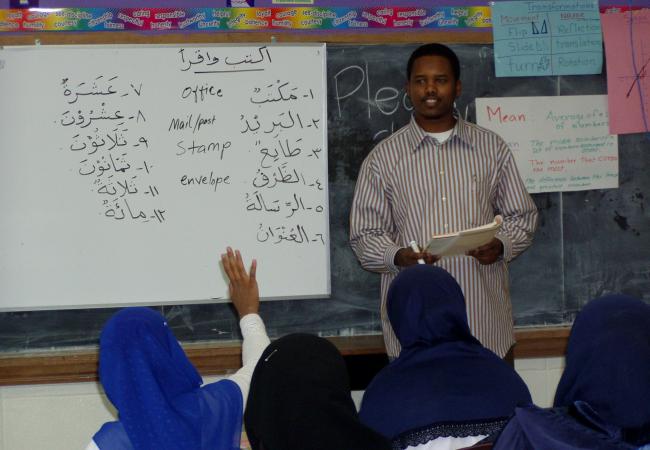Interacting with those who study Arabic
Over the course of the past several months I have been interacting with people who want to study Arabic, as well as a number of Arabic teachers. I began my own journey to study Arabic 25 years ago, and so it is really interesting for me to find out who wants to study Arabic now, and why.
Who wants to study Arabic? What are their motivations?
As an Arabic educator, knowing who wants to study Arabic is a crucial question. Knowing your audience is a key part of teaching effectively. And knowing their reasons for wanting to study can make your instruction much more successful. Motivation not only affects the speed at which a student will learn, but also the subject material that they want to cover, and their ability to take in and hold significant amounts of new language.
This week I was reading a 2006 study by Ghassan HusseinAli, a faculty member at George Mason University, entitled “Who is Studying Arabic and Why? A survey of Arabic Students’ Orientations at a Major University”. The study was from the United States, and from almost 9 years ago, but the results are still widely applicable.
Husseinali, Ghassan. “Who is Studying Arabic and Why? A Survey of Arabic Students’ Orientations at a Major University.” Foreign Language Annals 39.3 (2006): 395–412.
The two most interesting parts of Husseinali’s study, for me, were his findings on the different ethnic groups that were studying Arabic, as well as the reasons for studying Arabic.
Ethnic Groups
The three distinct “ethnic” groups (actually, ethno-religious groups) that emerged in the research were:
1. Learners of Arab descent
2. Learners who are non-Arab Muslims
3. Learners from different ethnic and cultural/religious backgrounds than the first two groups
Each of these groups brings a different level of Arabic with them when they begin studying Arabic. Typically, learners of Arab descent will have some level of familiarity with a spoken dialect of Arabic. Whether it is full verbal fluency, partial functionality, or a low level of receptive skills (ability to hear and recognize certain words or phrases, for example), this gives a distinct advantage to them over the other learners.
Non-Arab Muslims, while not typically enjoying the level of Arabic that learners of native Arab descent have, often have the advantage of having heard Arabic throughout significant portions of their lives in religious settings. Whether they simply grow up hearing the Qur’an recited, or have some personal experience in memorizing and reciting the Qur’an or other religious texts, this tends to give them the ability to pick up the phonetics and mechanics of Arabic more quickly.
Learners who have no Arab descent and are non-Muslim usually begin to study Arabic with no prior knowledge of Arabic. Because Arabic is a semitic language that bears no clear resemblance to European languages, this can be a more challenging process for them.
The first two groups, those of Arab descent and non-Arab Muslims, are referred to by HusseinAli as “heritage learners”. The third group is referred to as “non-heritage learners”.
Motivations to study Arabic
HusseinAli’s analysis showed two main types of reasons for people wanting to study Arabic language. These are Instrumental reasons, and Integrative reasons.
Instrumental reasons are reasons which are related to achieving a specific goal. These can include active instrumental orientations (i.e., “getting a job”), or passive instrumental orientations (i.e., “fulfill degree requirements”). The study found that non-heritage learners were more likely to have active instrumental orientations, while heritage learners were more likely to have passive instrumental orientations.
Integrative reasons include goals such as “interest in my own Arab culture”, “interest in my own Islamic heritage”, “conversing with people”, or “understanding Arabs’ problems”.
The study further grouped the various motivations into four main types of orientations. Thes include:
1. Travel and world culture orientation
“Meet people”, “Learn about other cultures”, “Travel to Arab countries”, “Plan to study abroad”
2. Political orientations
“Better understand Middle East politics”, “Understand the problems Arabs face”, “September 11 events”,
3. Instrumental orientations
“Arabic important in the economic development of the world”, “Get a good job”, “Understand the problems Arabs face”
4. Cultural identity orientations
“Understand literature”, “Interest in my own culture”, “Interest in my Islamic heritage”, “Islam as a world religion”, “Use Arabic with Arabic-speaking friend”
Overall, the study found that both heritage and non-heritage learners have a wide range of both instrumental and integrative orientations, but that heritage learners of Arabic language have motivational orientations that are “clearly and significantly different than those of non-heritage learners”. Heritage learners are “significantly more motivated than non-heritage learners” to study Arabic as a foreign language for identification reasons. Non-heritage learners are significantly more motivated to study Arabic for instrumental reasons. Both groups are equally motivated to study for cultural identity reasons.
What are your motivations for wanting to study Arabic? I would love to hear from you in a comment below, or on my Facebook page.
1. Husseinali, Ghassan. “Who is Studying Arabic and Why? A Survey of Arabic Students’ Orientations at a Major University.” Foreign Language Annals 39.3 (2006): 395–412.




 RSS - Posts
RSS - Posts